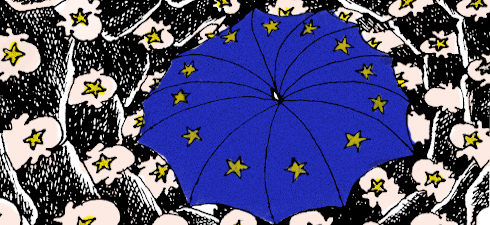The metaphor of the runaway train without brakes. The fear of a European Union that includes not only Turkey, but also the Ukraine, Georgia and Farawayistan as member states. Impossible to administer, diluted due to differences in culture and economic development.
This fear is fed by the fact that there is no hard eastern border, and that expansion appears to be the core business of the Union. Peace, safety and stability through integration. After 1989 the expansion with twelve member states just had to happen, even if everyone knew that certain candidate member states were not yet ready.
According to some people this meant the train had left the station. Not only because it de facto confirmed that expansion is purely a political matter, but also because the character of the Union changed in such way that adding even more countries really didn't matter that much any more.
And indeed: there are four more candidate member states engaged in official accession talks (Croatia, Macedonia, Montenegro and Serbia) and two other Balkan countries that are eligible (Albania and Bosnia-Herzegovina, if it doesn't fall apart). These countries are practically in the heart of Europe. “Moreover,” says Belgian political scientist Hendrik Vos, “if countries do end up doing the homework we asked them to do year ago, then it is difficult to say: just wait a while longer.”
There is a lot of discussion about whether the border is determined by geography, democracy, politicians or the voters. The answer: by all of them. That is why the idea that the Union is continually expanding is not correct.
Every national parliament has a veto right
Starting with geography. While there may not be an eastern border, there is a clear southern border. When it comes to democracy reference is always made to the Copenhagen criteria, the accession requirements such as the rule of law, fair elections, respect for human rights and something as vague as ‘shared values’.
According to europhiles, Europa welcomes the countries which are willing to embrace those values. But even according to Josef Janning, director of Studies with the European Policy Center and proponent of expansion, this also means that Russia and Turkey, for example, will never join. “Because they see themselves as special and do not want to function under anyone else's rules.”
And then the politicians. “You have to see where the ability to run a functional administration stops, with how many countries you can make laws together,” says Vos, who wrote two books about decision making in the EU. This limit seems to have been reached.
In addition, every national parliament has a veto right. This means that in the end public opinion is the ultimate brake on expansion. And in many countries the public no longer supports a bigger Europe. The time that accession could be bought off through economic growth is over.
Was this article useful? If so we are delighted!
It is freely available because we believe that the right to free and independent information is essential for democracy. But this right is not guaranteed forever, and independence comes at a cost. We need your support in order to continue publishing independent, multilingual news for all Europeans.
Discover our subscription offers and their exclusive benefits and become a member of our community now!












